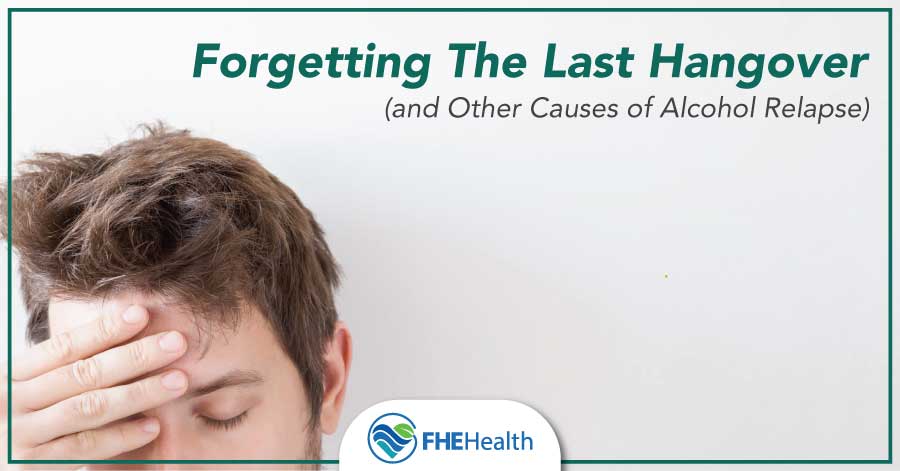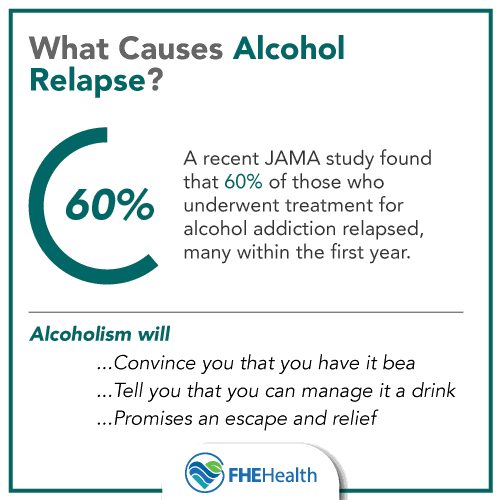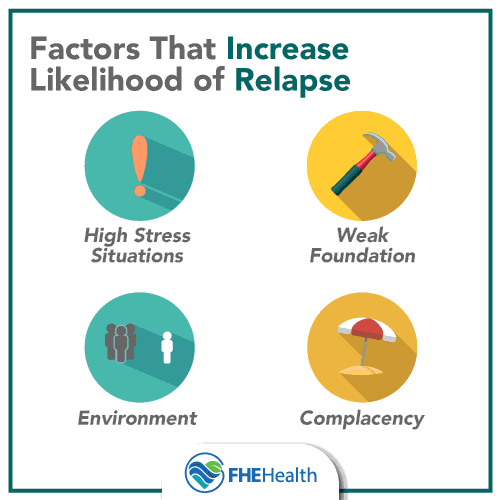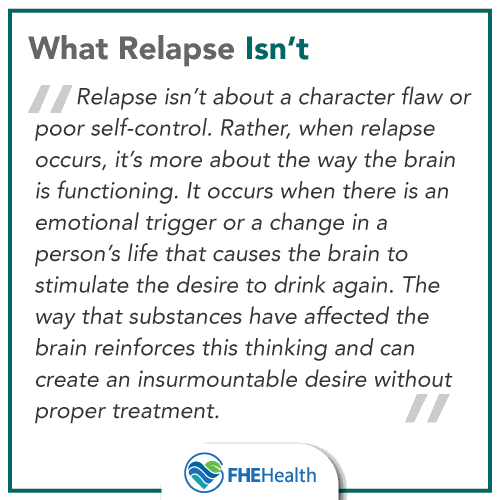
After spending a few days in detox and three weeks in an inpatient treatment center, it seems that all the hard work and effort has paid off. You’re sober and seeing life through clear lenses for the first time in a long time. You have done the work, attend your AA meetings and feel confident in your ability to push a drink away. So, then, why did you pick up that drink again? What makes someone relapse after putting in all this work and feeling good about themselves and their recovery?
Whether this is something you’re battling about yourself or you’re watching a loved one relapse, there’s little doubt that it’s troubling. Why does someone drink after being sober?
Understanding Addiction: Using Isn’t Always Simple

Alcoholism is an insidious disease. It’s the type of condition that convinces you that you’ve got it beat, especially after spending time in detox and inpatient treatment and with ongoing outpatient care. This disease convinces you that it’s less than what it is. And, while an addict feels they’ve beaten it after working through addiction, the fact is that’s rarely the case.
Many times, this disease convinces a person that they can manage drinking. It also promises to provide a temporary escape from day-to-day life. It gives them relief and feels comfortable.
Consider what happens to an average nonaddicted person. You have a night on the town and suffer a horrible hangover. It’s so bad you promise yourself you’ll never drink like that again. For a person with an alcohol use disorder, a single drink can create numerous consequences and long-lasting repercussions. These are more severe and harder to ward off in the coming days and months. An addict should never touch another drink due to the control the substance has on their future.
It’s also important to recognize that relapse isn’t an indication of failure. It doesn’t mean the person can’t get sober again or that they’re a lost cause. Rather, relapse is a hurdle and a common setback.
Alcoholism Is a Brain Disease
For those looking into the world of an alcohol addict, it’s hard to see why it’s so hard to just stop drinking. You may think it’s pretty easy to simply stop because your brain isn’t wired to addiction. When you view addiction as a type of brain disorder, one that’s changed the chemistry and makeup of the brain itself, it’s easier to understand why relapse occurs.
A component of this brain disorder is a compulsion to use. Despite the fact that those with addiction recognize that drinking is unhealthy and carries various consequences, they feel desire and compulsion that’s hard to manage alone.
What Situations Increase the Likelihood of Relapse?

High-Stress Situations
Addicts who struggle with high levels of stress are more likely to relapse than those who don’t. It may be hard to live a stress-free life when you’re battling addiction and the consequences it creates. Stress is hard for anyone to manage, but for the recovering alcoholic, it can mean a high level of temptation to drink. Alcohol is a great tool for numbing feelings, which often makes it a go-to choice for men and women battling stress.
Not a Strong Foundation
In some situations, the problem with relapse occurs at the base or foundation of the recovery path. This could mean the alcoholic doesn’t have a strong support system to provide the proper encouragement. More commonly, it’s due to a lack of strong treatment. Men and women who don’t enter inpatient treatment or obtain intensive outpatient treatment when they need it are most at risk for developing relapse. Routine use and high-quantity use of alcohol make these treatment settings essential.
Their Environment
Social situations don’t always change just because a person has gone through rehab. Some may be facing the same people and locations that bring back memories of use. If alcohol is readily available and a lax attitude on drinking is present in a person’s work, school or home life, that makes relapse more likely to occur.
Triggers are another key component of some environments. If you have an addiction, receive treatment and then are facing the same circumstances that created that addiction, you’ll likely use again. This could be trauma, unmanaged mental health problems, family turmoil or poor social engagement.
Complacency
In other cases, relapse happens because an addict isn’t taking their addiction seriously. They are happy with their life, feel like they’ve beaten the addiction and believe they can step back into daily life. Can alcoholics every drink again? In nearly all situations, the answer is no. While many may think a single beer is no big deal or a glass of wine isn’t going to hurt them, a single drink is all it takes to get back on the road to abuse.
Relapse Isn’t About a Lack of Willpower or Poor Character
It’s also important to recognize that relapse isn’t about a character flaw or poor self-control. Rather, when relapse occurs, it’s more about the way the brain is functioning. It occurs when there is an emotional trigger or a change in a person’s life that causes the brain to stimulate the desire to drink again. The way that substances have affected the brain reinforces this thinking and can create an insurmountable desire without proper treatment. The person is actually facing a physical demand from their brain to drink.
Another way to view this is as a disease. If a person with cancer enters remission but the cancer comes back, it’s not their fault. It could be due to the lack of full eradication of the cancer cells from the body. A lack of enough treatment for addiction can have the same effect. In other cases, new triggers can create the same reaction. When you view it like this, it’s clear to see that it’s not the alcoholic’s fault or failure that leads them to this path.
What Does Long-Term Success Look Like for an Alcoholic?

A question many have, though, is about the risk of relapse. The longer a person goes without relapse, the more likely they won’t relapse in the future. There’s never a guarantee because there’s no foolproof cure for alcoholism. Once the alcohol has damaged the brain and chemical dependency has occurred, that tendency remains long term.
Yet, a person with an alcohol use disorder isn’t going to lead a life of turmoil in most cases. They can still live a healthy life with routine care and ongoing counseling. Additionally, those with alcoholism can learn new ways to deal with stress, better manage triggers and improve their physical health.
Looking for Help from Alcohol Addiction or Relapse?
In every situation, it’s best to receive treatment as soon as possible when relapse occurs or when you or your loved one begins thinking about drinking again. If you’re in this place, seek out care from our compassionate team at FHE Health. Call our counselors 24 hours a day for immediate help at any stage in alcohol addiction treatment. Call us at (833) 596-3502 now.






